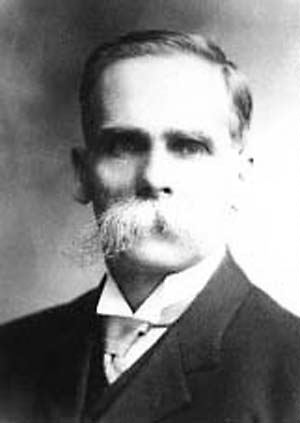Search | Image Archive | Reference | Communities | POV | Lesson Plans | Credits
 When Clifford Sifton resigned as Minister of the Interior and Superintendent General of Indian Affairs in 1905, he was succeeded by Frank Oliver, a journalist and Member of Parliament for Edmonton.
When Clifford Sifton resigned as Minister of the Interior and Superintendent General of Indian Affairs in 1905, he was succeeded by Frank Oliver, a journalist and Member of Parliament for Edmonton.
Oliver was born in 1853 in Upper Canada (Ontario) and trained as a journalist in Toronto and Winnipeg before establishing himself in Edmonton in 1880. There, he established the Edmonton Bulletin, a newspaper that he owned until 1923. He had a long career in politics, first as Alberta's only Member of Parliament and later as the member for Edmonton. In 1905 he became Minister of the Interior in the Laurier Liberal government.
As Minister of the Interior, Oliver dramatically altered the immigration polices established a decade earlier by Sifton. Whereas Sifton had favoured agriculturalists over urban workers and had opened the doors for many of eastern European origin, Oliver was staunchly British, and his polices favoured nationality over occupation. At the time he took office, there was already a hostile response building in the west over the entry of non-British immigrants. With their vastly different customs, language and habits of dress, many of these new immigrants did not assimilate rapidly to British-Canadian norms. Nativist groups sprang up to preserve and defend "Canadian" language, culture and values.
Oliver presided over a series of amendments to the Immigration Act between 1906 and 1910 which allowed immigration agents to exclude entrants on a variety of grounds, including moral unfitness, probability of becoming a criminal or ward of the state, and probability of engaging in revolutionary activity. The cumulative effect of these changes was to vastly increase the proportion of immigrants who were of British ancestry, including paupers and those assisted by charitable organizations. Immigration from Central and Eastern Europe was sharply curtailed, and Blacks, Orientals and immigrants from India were virtually barred or subject to prohibitive head taxes.
Although Oliver professed a preference for farmers, many who immigrated during his tenure were unskilled workers or "navvies." As railway construction boomed after 1907, the demand for workers increased. Few Canadians of British origin would tolerate the low wages and poor working conditions of the construction camps, and thousands of unskilled labourers, many of whom were "sojourners" from Italy, were imported to fill the camps. By 1910, the demand was so high that "alien navvies" were afforded unrestricted entry, a policy that was continued after 1911 by the Conservative government of Robert Borden until the outbreak of war in 1914.
Page revised: 28 August 2009